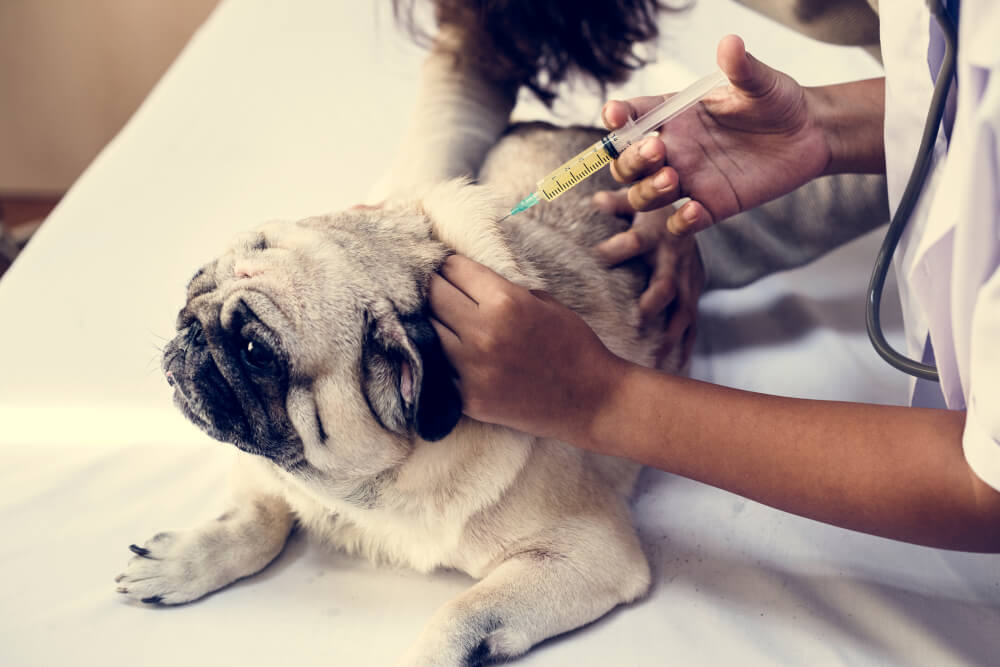You may have heard about leptospirosis, or lepto, when a Neighborhood Vets Mobile Care team member has discussed your dog’s annual vaccinations. But, you may not know much more than realizing protection against this disease is important for you and your pet. Read on to learn about lepto, how it’s transmitted, and why you need to be concerned about this disease.
What is leptospirosis in dogs?
Leptospirosis is a bacterial disease that is considered the most widespread zoonotic infection in the world. As a zoonotic infection, lepto can be spread not only from an infected dog to a person, but also can infect other animals. The bacteria that causes lepto lives in water or warm, wet soil, so wildlife or water-loving dogs can easily pick up the disease.
How is leptospirosis transmitted to dogs?
Leptospirosis is transmitted to dogs through direct or indirect contact. Leptospires, the bacteria that causes lepto, enter your pet’s body through the mucous membranes in the mouth, eyes, or nose, or through open sores or water-softened skin. The bacteria multiply in your dog’s bloodstream, and then travel to the kidneys and other tissues, continuing to reproduce. Leptospires pass from your dog’s kidneys into the urine, and are shed back into the environment. Other dogs, wildlife, or people can then become infected by coming in contact with your dog, or through the contaminated urine. The urine can leach into bodies of water, and the disease can be passed to people and animals swimming or drinking.
Is my dog at risk for contracting leptospirosis?
Prevalence of canine leptospirosis has increased in recent years, with as many as 8.2 percent of dogs shedding leptospires. Weather changes, population growth, and habitat encroachment have all increased human and canine exposure to pathogens and their carriers. Here in Kansas City, lepto cases have increased because of transmission by rats. If your dog swims, laps from puddles, encounters wildlife, or comes in contact with infected rodent urine, they’re at risk for leptospirosis.
What are leptospirosis signs in dogs?
Clinical leptospirosis signs in dogs are vague. People show flu-like symptoms, but your dog may show the following signs:
- Fever
- Lethargy
- Weight loss
- Inappetence
- Depression
- Acute renal failure
- Jaundice from liver failure
- Vomiting and diarrhea
How is leptospirosis diagnosed in dogs?
Leptospirosis in dogs is diagnosed through evaluation of clinical signs, a physical exam, blood work, X-rays or ultrasound, a urinalysis, and a blood test. Since lepto can present like many other illnesses, changes in blood work, urinalysis, and imaging may not be helpful, and blood and urine tests will be necessary to detect the lepto organisms and confirm a diagnosis.
How is leptospirosis treated in dogs?
Treatment requires antibiotic therapy and intravenous (IV) fluids, to help preserve kidney function and flush out the bacteria. A urinary catheter may also be placed, to contain the infected urine, and monitor urine output and kidney function. Supportive medications may be administered, to prevent nausea and vomiting. With early diagnosis and appropriate treatment, the survival rate for leptospirosis is approximately 80 percent.
Why is leptospirosis so dangerous for pets and people?
Progressive leptospirosis can cause many problems, including blood vessel damage, clotting problems, and kidney failure, and can interfere with liver function. If your dog is infected with lepto, they can enter a carrier state, shedding bacteria in their urine for weeks to months, putting you and your family at risk for contracting lepto from your pet.
How can I protect my pet and myself from leptospirosis?

Leptospirosis is a real threat to pets and people in our area, and case numbers continue to rise. The best way to keep you and your furry pal safe is to ensure your dog is vaccinated for leptospirosis with a multi-serovar vaccine. The more serovars, or strains, a vaccine protects against, the safer your dog.
In addition to keeping your dog current on their lepto vaccine, you should reduce their disease risk by keeping them away from water bodies. Swimming and drinking from ponds, lakes, rivers, and streams should be off-limits, to prevent disease transmission to your pet, and to you.
Protect your dog and your family from the threat of leptospirosis by staying up to date on their vaccinations. Contact Neighborhood Vets Mobile Care to schedule your pet’s appointment.

